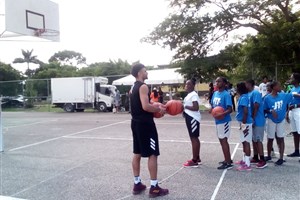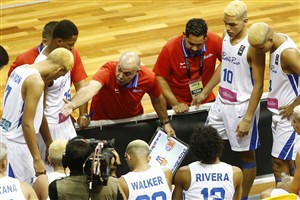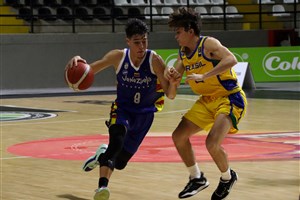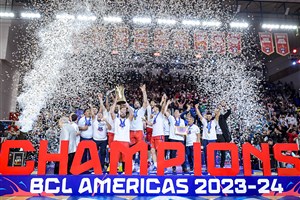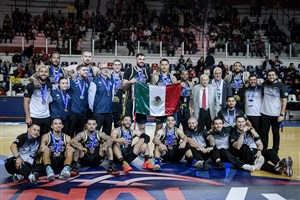
How to popularize Mini Basketball through the value of teaching
BUENOS AIRES (Argentina) – The Argentine Basketball Confederation (CABB, for its Spanish acronym) has been teaching basketball for over a year through a training manual known as the “CABB Method”; a tool that seeks to draw transversal lines to develop basketball. It's a starting point to share knowledge and to attempt leaving unaltered the teaching processes.

This Friday, October 11 will be a historic day for the Confederation, who'll present the "Mini Basketball Manual: A Teaching Guide," whose objective is to turn it into the tool to uniform the working method, conduct, and principles for formative categories.
The Method was initially created for youth ages 13 to 17 and for all teachers and trainers that work or will work with these ages. It strives to focus on learning over results, on teaching individual techniques over collective tactics, and on popularizing the sport.
The CABB, like other federations, strongly believe that players develop and grow when the relation between training and competition quality go hand in hand through a series of guides and suggestions, as well as with the participation of not only the CABB staff but also of several sports personalities. And because of this, the CABB Method Manual for trainers was created. Then came the workshops throughout the entire country, the suggestion of a sole rulebook, a YouTube channel titled "CABB Formativo", research, and other aspects.
Since Federico Susbielles took charge of the CABB, first as comptroller and then as president, he envisioned the generation of this formative method with national team staff member Silvio Santander – who’s assisted all recent national teams, was Sergio Hernández’s first assistant at the FIBA Basketball World Cup in China 2019. However, there are other trainers as well in different regions.
“Today we have a formative methodology for children over 13 years. Now we’ll do the same for Mini Basketball throughout the country. We created a single vision and criteria of how to teach the game, something that didn’t exist before,” said Silvio Santander to FIBA.basketball.
Santander considers that there was an evolution regarding the consideration of players with height and on not looking for results as the sole objective. "At the formative stages, the end doesn't justify the means. The idea is to build to feed the national team, develop the greatest number of prospects, and not trying to win a tournament regardless of the price…" he assured, while pointing out: “It's very important to have such a valuable tool that allows us to replicate the CABB Method throughout the territory.”
This plan also has an online platform that follows the evolution of more than 800 players. As wasn’t witnessed several years ago, the names of Argentine players are appearing again in great programs around the world, such as the NBA academy, and the most important camps, such as FIBA’s Youth Development Program Elite Camp, Basketball without Borders, the Jordan Brand Classic or the NBPA Top 11. Professional teams in the South American nation have also started to recruit these talents from neighborhood clubs that have gone through the CABB scouting process.
"This is another one of the proposals that without a doubt will contribute to the growth of Argentine basketball," said CABB President Federico Susbielles to FIBA.basketball, who also shared: "Each one has their work scheme within a multi-disciplined plan that has physical trainers, nutritionists, psychologists, physical therapists, and a doctor. We also improved Plan Altura (Height Plan). We identified players but weren't following the tall kids that were coming in. Now we are."
The Manual represents a collection work of multiple experiences within Mini Basketball. Its objective is to present a starting point to think about teaching and is destined for trainers that have chosen to teach the sport from the youngest stages. Because of this, it’s been designed as a guide, so that it can be expanded and improved throughout time.
This Manual, created by professors Javier Orlandoni, Juan Lofrano, Pablo Genga and Maximiliano Seigorman in its initial stages, is the link that was lacking to close the chain. Now, a dedicated, detail and clear work can be offered and can reach all Mini Basketball teachers in Argentina. Its standpoint is the vocation to share knowledge, to seek a reference point – and the acknowledgment that trainers and teachers have a lot to offer to younger generations.
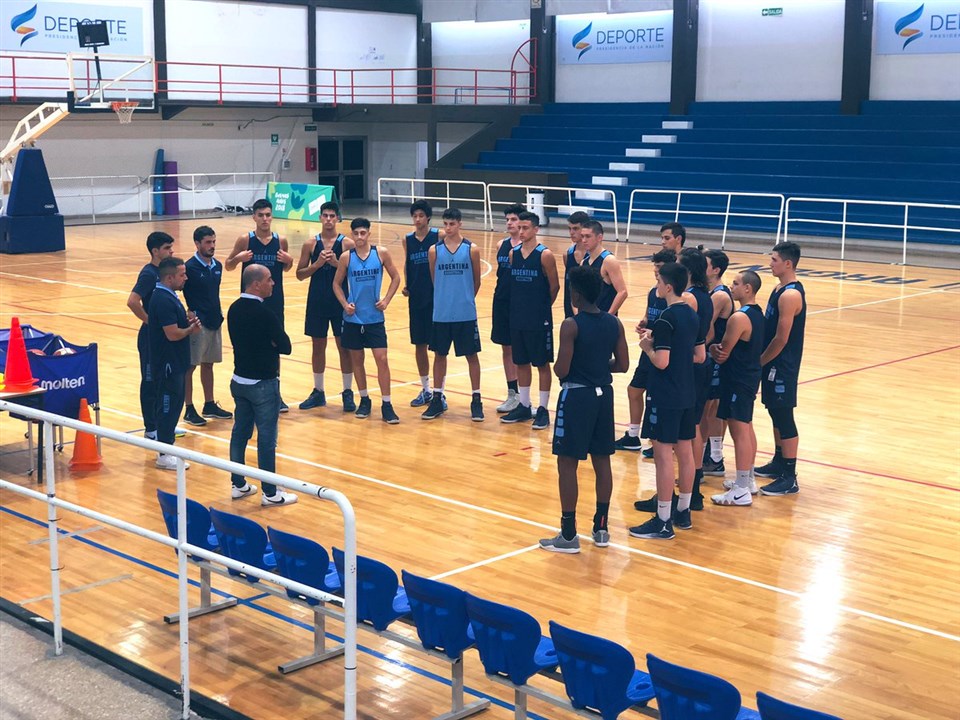
"It's a necessary tool to improve children's beginnings in sports, particularly in a society in which the youth leads more and more a sedentary lifestyle due to the inclusion of screens in our children's lives. We must be updated on how to teach sports better and how to popularize and reach the largest possible number of boys and girls. The CABB and its history force us to aim for perfection, to be a model school at a global level, and to be able to be at the level of the sports programs of the world powerhouses," explained Pablo Genga, who added: "The Manual provides answers. It seeks to initiate children that are different from those that came 20 years ago, and to build a healthy person that sees basketball as a way of life, as a player, as a trainer or as a coach, but within a club."
Another one of the main factors to design the Manual was to support the National School of Trainers (ENEBA, for its Spanish acronym), which was very influential both in national team staff member Facundo Petracci and in ENEBA Director and National CABB Coordinator Maximiliano Seigorman.
“This work is truly a collective task that gathers and joins the efforts of hundreds of trainers that have contributed to building this proposal. This product is a joint task by the Mini Basketball Department and ENEBA and entails an articulate work by both CABB programs,” said Maximiliano Seigorman, ENEBA Director.
The Manual has 12 chapters that describe the philosophy for youth categories (for both boys and girls), and includes physical and nutritional guides, and opinions by experts, players, former players, and trainers, an a technical-tactical in-depth look, and many other concepts as part of a national identity in the long process and path that is player formation. The Manual is in constant expansion and its objective is also to share the Argentine training school with other countries.
"The idea is to unify concepts, to regulate competitions, and to research. It'll be updated every year because we're in constant contact with trainers and professors – we hold conferences, debates, and talks that also serve as feedback to improve it throughout time," said Santander.
Meanwhile, coach Sergio Hernández, the second-place winner with Argentina at the recent FIBA Basketball World Cup, added: "The Mini stage is essential in the pyramid of our discipline and can't be underestimated. This is a nation that relies too much on improvising. But the Method, although it's not the absolute truth, will help guide us. The Manual is worthy of admiration throughout the entire world. The idea is that everyone can access it. This has to do with a collective characteristic in Argentine basketball: generosity." He also pointed out: "We have to take this sport to children and not wait for them to come to the sport because sports are the most important tool for humanity to educate, include and improve society."
CABB's need to think about this learning stage motivated them to generate a theoretical-practical tool whose objective was organizing the activity and try to unify teaching criteria throughout the South American nation.
The Manual is designed to be used critically and reflexively regarding its proposed practices, and that it can generate new questions and renew the vocation to share the passion for teaching and the importance of teaching technical, tactical, regulatory, motor, emotional and linking aspects. It's not only focused on teaching things that are exclusive to the game, but also on visualizing the sport as a potential educational practice.
In the Manual's prologue, Argentine basketball role models like Emanuel Ginóbili and Facundo Campazzo share their beginnings in Mini Basketball.
"This Manual is determining for trainers and teachers in our country: working with children requires a passion for teaching that not everyone can foster. Sharing knowledge with clarity, criteria and patience in such a primary formative stage is key for the eventual development of the player. Mini Basketball should instill in the child the love for the sport and team play," Emanuel Ginóbili stated.
Meanwhile, the Argentine national team and Real Madrid point guard, Facundo Campazzo, said: "Mini players are, in the end, children going through childhood. They need to learn, grow, developed, and not be judged if they make mistakes. The important thing is that they live the experience of playing basketball, of making friends, of practicing sports, of not being in the streets. The club must be a welcoming place and trainers should work as teachers. Kids are kids. There'll be time for demands."
"This follows the same direction of the Manual for Formative Trainers and the Manual for Physical Training for Formative Categories. It's a suggestion, a contribution and a guide where trainers and professors can go to enrich their knowledge. It's not the whole truth, but rather a suggestion and idea that we have of recovering and strengthening the value of teaching. We understand that competition complements the kids' development and that we're not going to look for results as the only option and priority. Competing will be a consequence of formation and we don't have to alter the process of teaching," Santander pointed out.
The Method undergoes a phase that starting next year will host a variety of features such as certifications, specializations through ENEBA, and research projects that will be published to show how new teaching dynamics have grown and updated.
The Method started some time ago and is currently in a process to continue to generate activities. For 2020, CABB is considering hosting related activities of this initiative that has started, is gaining force, and is moving forward.
“Another important step given by CABB has been recovering our Mini Basketball Department thanks to professors Juan Lofrano and Pablo Genga. This allows us hosting “The Method” since its initial stages, covering the initial years until junior categories,” said Santander.
"On January 2019 we started to give an identity to the Mini Basketball Manual, whose objective is to be a starting point and a guide. In no way whatsoever it's a Manual that prescribes exercises or establishes formulas or set rules. The idea is for trainers anywhere in the country to read it and make them think, to allow them to contextualize what the Manual proposes with his reality and the place where he's tasked to develop Mini Basketball. The best way we can respect the child is to teach them well," said the CABB Mini Basketball Coordinator, Juan Lofrano, to FIBA.basketball.
"We rely on the CABB’s excellent specialists: Carlos Saggio in Psychology, Luciana Spena in nutrition, and Claudio Fratoni in the physical training area. We feel very proud and, after the second-place win by the national team in the FIBA World Cup, feeling backed by Sergio Hernández and Silvio Santander is very important," added the physical education teacher and ENEBA level 3 basketball trainer.
Like this, the CABB continues to develop the youth according to the concepts held by the “Golden Generation”, nowadays “El Alma” (The Soul) – silver medal winners in the most recent edition of the FIBA Basketball World Cup 2019 in China. The idea is to keep fighting for their goal of developing children through sports.
"If we develop good trainers we will improve and have better practices. Everything the national team has been doing, particularly this last generation in the World Cup, in some way what does is generating a lot more expectations and excellency in teamwork, in seriousness, in consistency. We want to reproduce that within the Argentine basketball structure, and within Mini Basketball as well, in this case. What happened in the last World Cup was very important. The work of the technical staff and players multiplies a bit what Argentine basketball represents," assured Javier Orlandoni, ENEBA Education Advisor in Argentina.
"We've tried to discuss and synthesize through a previous diagnosis on what's going on with Mini Basketball. We hope Argentine basketball starts winning in tradition, that they get used to formalizing and creating a written and filmed bibliography, and allow for its discussion," he concluded.
This is another one of the tasks, as everything the CABB has been doing in development, to invite everyone through this Manual to join the great family of formative basketball in Argentina. Good trainers generate good practices, and good practices will improve basketball.
FIBA

